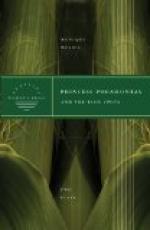“Take this chain in remembrance,” he said. Then his comrades pressed forward, each with some gift they emptied into the maiden’s hands.
She gazed at them all lovingly, but she shook her head slowly, the tears falling as she said:
“I dare not, my friends; if my father should behold these gifts he would kill me, since he would know that it was I who had brought ye warning.”
Slowly she took off the chain and reluctantly placed in it Smith’s hand, and let gently fall the other treasures she longed to keep. Smith bent and kissed her hand as reverently as he had once kissed that of Good Queen Bess.
Pocahontas started. “I hear them coming,” she cried, and with one bound she had sprung forth again into the night, skirting the river until she was sure of reaching her lodge without running into the troop of Indians advancing with dishes and baskets of food, who, however, were not slaves but braves and armed.
When these reached the stranger-lodge they brought in the supper and laid it down with apparent great heartiness that is the few who actually bore the baskets. The others found themselves somehow halted by Smith at the entrance and engaged in ceremonious conversation. When they suggested that the white men lay aside their weapons and seat themselves the better to enjoy their food, Smith replied that it was the custom of the English at night always to eat standing, food in one hand and musket in the other. For a long time this parleying went on; Smith would not show that he had discovered their perfidy.
Then the baffled Indians retired to the forest, to await the moment when they could catch the white men off guard. But though all night they spied about the lodge, not once did they find the sentinels away from their posts, and they had too much fear of the “death tubes” to attempt an onslaught on men so well defended.
So, thanks to Pocahontas, the morning dawned on an undiminished number of English, and at high tide they embarked in their boat and returned to Jamestown with their provisions so precariously won.
[Illustration: Decorative]
CHAPTER XV
A FAREWELL
The late summer sun was beating down pitilessly upon the lodges and open spaces of Werowocomoco. Even the children were quiet in the shade, covering their heads with the long green blades of the maize, plaiting the tassels idly and humming the chant of the Green Corn Festival they had celebrated some weeks before. The old braves smoked or dozed in their wigwams, and the squaws left their pounding of corn and their cooking until a cooler hour. The young braves only, too proud to appear affected by any condition of the weather, made parade of their industry and sat fashioning arrow-heads or ran races in the full sunshine, till a wise old chief called out to them that they were young fools with no more sense than blue jays.




